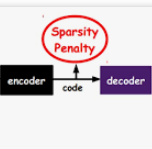Gammachirp filterbank has been used to approximate the cochlea in sparse coding algorithms. An oriented grid search optimization was applied to adapt the gammachirp's parameters and improve the Matching Pursuit (MP) algorithm's sparsity along with the reconstruction quality. However, this combination of a greedy algorithm with a grid search at each iteration is computationally demanding and not suitable for real-time applications. This paper presents an adaptive approach to optimize the gammachirp's parameters but in the context of the Locally Competitive Algorithm (LCA) that requires much fewer computations than MP. The proposed method consists of taking advantage of the LCA's neural architecture to automatically adapt the gammachirp's filterbank using the backpropagation algorithm. Results demonstrate an improvement in the LCA's performance with our approach in terms of sparsity, reconstruction quality, and convergence time. This approach can yield a significant advantage over existing approaches for real-time applications.
翻译:Gammachirp 过滤器库被用来在稀疏的编码算法中接近cochlea 。 应用了定向网格搜索优化来调整伽马西略参数,改进匹配追求算法的宽度以及重建质量。 但是,贪婪算法与每次迭代的网格搜索相结合,在计算上要求很高,不适合实时应用。 本文展示了优化伽马西略参数的适应性方法,但在本地竞争性阿尔戈里特姆(LCA)背景下,这比MP需要的计算要少得多。 提议的方法包括利用LCC的神经结构,利用反调整算法自动调整伽马其略的过滤库。 结果显示,LCA在宽度、重建质量和合并时间方面的表现与我们的做法相比有所改进。 这一方法可以对实时应用的现有方法产生显著的优势。



